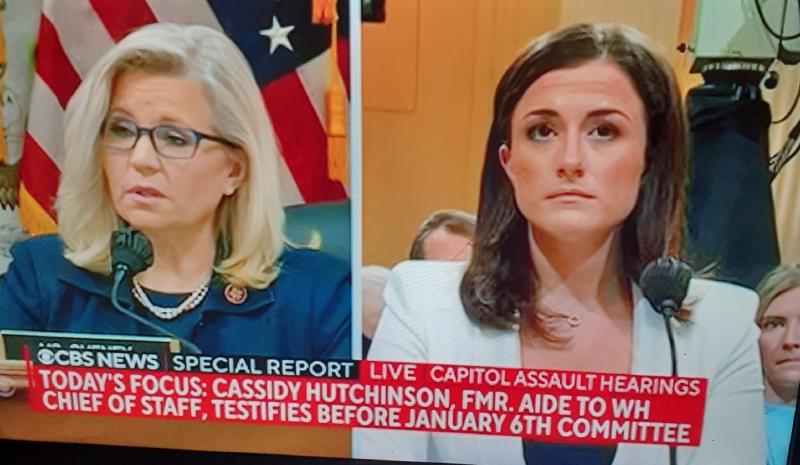Opinion | George Conway, Randall Eliason: Hutchinson testimony shatters Trump defense of no criminal intent - The Washington Post
Category: News & Politics
Via: jbb • 3 years ago • 2 commentsBy: George T. Conway III (Washington Post)



By George T. Conway III and Randall D. Eliason June 30, 2022 at 1:47 p.m. EDT
If Donald Trump is ever criminally charged for his efforts to remain in power after losing the 2020 election, the central issue will be his state of mind: Did Trump act with criminal intent? Or was he just innocently, though aggressively, pursuing all possible avenues of lawful recourse to remedy what he truly believed was a stolen election?
His potential defense of lack of criminal intent was flimsy to begin with. After Tuesday's devastating testimony from former Trump White House aide Cassidy Hutchinson, it lies in tatters. Proving Trump's culpable state of mind just got a whole lot easier for prosecutors.
With Hutchinson's testimony, we now know that Trump was aware that some of his supporters were armed when he urged them to march on the Capitol and "fight." "I don't f-ing care that they have weapons. They're not here to hurt me. … They can march to the Capitol from here," Hutchinson recalls Trump saying. Trump didn't even care about the risk to his own vice president. According to Hutchinson, Mark Meadows, Trump's final chief of staff, said Trump was not worried about the protesters' chants of "Hang Mike Pence" and thought "Mike deserves it." And she said Trump's own White House counsel warned that if Trump were to go ahead with his own plans to lead the march on the Capitol, "we're going to get charged with every crime imaginable."
The evidence of Trump's corrupt intent was already pretty strong. The Jan. 6 committee earlier presented extensive evidence of his pressure on state officials to alter election results, his scheme to corrupt the Justice Department and enlist it in his efforts, and his relentless pushing of the "big lie" despite repeatedly being told — by his own people — that there was no election fraud.
But Hutchinson's testimony might well have put the case over the top. She tied Trump directly to the assault on the Capitol itself — the violent culmination of weeks of acts aimed at obstructing the peaceful transition of power. Now, he can no longer plausibly claim — if he ever could — that this was just a peaceful protest gone bad.
Some argue that prosecutors could face difficulty proving criminal intent if it appears that Trump sincerely believed he had won the election. But that argument is misguided. Even if Trump believed, however implausibly, that there really had been massive voter fraud, that would establish only his motive for acting, not his intent. But a righteous motive is not a defense. Put simply, criminal acts motivated by an honest belief in the justness of one's cause are still criminal acts.
Consider the case against O.J. Simpson — not the murder case but the one that ultimately put him in jail: for armed robbery in a Las Vegas hotel room. Simpson believed a memorabilia dealer had stolen personal items from him. So he and his co-conspirators took the items back at gunpoint.
But Simpson's motive — his belief that the items were rightfully his — didn't help him, and he ended up serving nine years in prison. What mattered was that he intended to, and physically did, take the items back by force, using a deadly weapon.
By the same token, even if Trump truly believed there had been election fraud — indeed, even if there had been election fraud that affected the outcome — he wasn't entitled to unleash a mob on the Capitol, or to intimidate his vice president or Congress into violating their legal duties, or to have phony electoral certificates sent to Washington. His irrational belief that the election outcome was wrong would not negate his criminal intent.
As with Simpson's claimed righteous state of mind, Trump's alleged belief that "frankly, we did win this election" won't help him, either. If Trump is shown beyond a reasonable doubt to have intended to overturn the election by illegal means — by fraud or corruption or force — he has a guilty state of mind. If Hutchinson's testimony stands up — and it's entirely consistent with many things we already know — any claim that Trump lacked criminal intent would be laughed out of court.
It's still relevant, though, that Trump actually did know he lost the election. That knowledge can be shown by willful blindness — the legal rule that a defendant may be deemed to know something if he deliberately closes his eyes to the truth. Trump was told countless times — by advisers and by more than five dozen courts — that he had lost and had no valid legal recourse on Jan. 6, 2021. He simply shut his eyes to that reality.
Willful blindness can be used to establish only knowledge of a fact (I lost the election), not criminal intent. But the questions of knowledge and intent can intertwine. If Trump knew he lost the election, that would strongly reinforce the case that he acted with criminal intent in trying to overturn the election despite that knowledge.
Prosecutors considering whether to charge Trump with, say, conspiring to obstruct the congressional certification of the electoral vote now have near-smoking-gun evidence of intent. Even if Trump was "detached from reality," as former attorney general William P. Barr put it, he's still responsible for his actions. And now it's clearer than ever that Trump intended to stay in office by any means necessary — even violent ones.
The Jan. 6 insurrection
The House select committee investigating the Jan. 6, 2021, insurrection is holding a series of high-profile hearings this month.
Congressional hearings: The House committee investigating the attack on the U.S. Capitol has conducted more than 1,000 interviews over the last year. It's sharing its findings in a series of hearings starting June 9. Here's what we know about the hearings and how to watch them.
The riot:On Jan. 6, 2021, a pro-Trump mob stormed the U.S. Capitol in an attempt to stop the certification of the 2020 election results. Five people died on that day or in the immediate aftermath, and 140 police officers were assaulted.
Inside the siege: During the rampage, rioters came perilously close to penetrating the inner sanctums of the building while lawmakers were still there, including former vice president Mike Pence. The Washington Post examined text messages, photos and videos to create a video timeline of what happened on Jan. 6.
Charges: Proud Boys leader Enrique Tarrio and four lieutenants have been charged with seditious conspiracy, joining Oathkeepers leader Stewart Rhodes and about two dozen associates in being indicted for their participation in the Capitol attack. They're just some of the hundreds who were charged, many of which received punishments substantially lighter than what the government requested.

Tags










